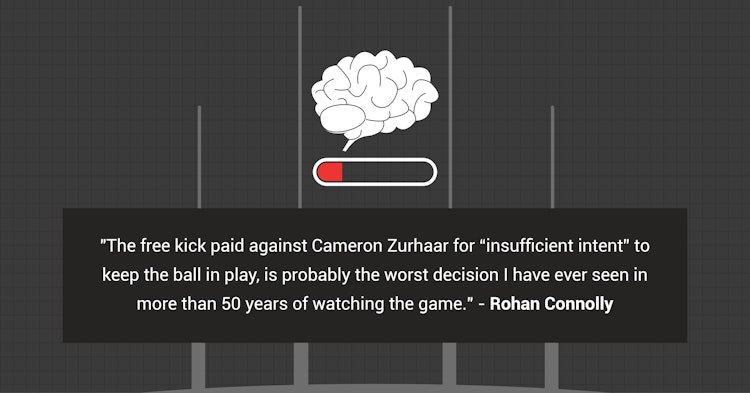Are AFL Umpires Suffering From Mental Exhaustion?
Last updated: May 11, 2021, 5:42AM | Published: May 10, 2021, 3:28AM
It’s pretty easy to take one example from a field of thousands and use it to prosecute an argument.
It happens in AFL football all the time, and in no area more so than umpiring.
Yes, umpires make mistakes. But relative to the amount of decisions they make in a game, not that many. Certainly a lower percentage than the players they police each week do.
So I’m always pretty sceptical, and not a little bored, when we routinely get one of those “umpiring worse than it’s ever been” debates going on.
And yet, the convergence of a couple of events over the past week has had me heading in the same direction.
Not so much as to the standard of AFL umpiring. But how difficult a task it has become.
First, AFL umpires coach Hayden Kennedy announced his resignation suddenly, in the middle of a season in which a slew of new rules have been introduced and there’s perhaps even more work than usual to be done. The other moment was, yes, one of those few mistakes.
RELATED: Check out all of Stats Insider's 2021 AFL season projections
I have no reason to doubt Kennedy’s departure was due to the “family reasons” cited, though there were reports of a growing degree of friction between senior umpires and AFL football operations boss Steve Hocking.
But former umpires boss Wayne Campbell did write a piece during the week about Kennedy in which he stressed the incredible workload Kennedy’s job entailed, commenting that he was “amazed he has been able to carry [the workload] for this long”.
That’s the umpires’ coach. And the actual umpires? Well, I’ve wondered similarly, not in terms of physical demands, but the mental toll of the job these days considering the huge roll call of new rules, interpretations and officiating responsibilities the job now entails compared to even 20 years ago.
How do they remember that long list of not just newer tasks like the “man on the mark” rule, but the dozens seemingly so trivial most of us pundits and punters don’t even think about them, whilst keeping focus on the more basic stuff?
And that’s where that one isolated example from a game on Saturday – between North Melbourne and Collingwood - comes in.
Without wanting to be cruel, the free kick paid by umpire Dean Margetts against North Melbourne’s Cameron Zurhaar for “insufficient intent” to keep the ball in play, is probably the worst decision I have ever seen in more than 50 years of watching the game.
Was it totally his fault? I wonder. Because this particular rule is a very good example of the often ambiguous and vague nature of the current AFL Laws of the Game.
Rule 18.10 (b) says a free kick will be awarded against a player who “kicks, Handballs or forces the football over the boundary line and does not demonstrate sufficient intent to keep the football in play.” That used to be known as “deliberate out of bounds”. That, obviously, has changed dramatically as the interpretation has tightened.
But “not demonstrating sufficient intent to keep the football in play” plunges the whole thing into murky grey, where, far from just deciding whether a play has deliberately forced the ball out, an umpire is now required to effectively read the mind of a player.
Let’s say the player hugs the boundary line with a kick. He may desire first and foremost to seek territorial advantage, but has a safety valve if his team doesn’t look like taking possession.
Is that insufficient intent? Maybe, maybe not. The percentages of each purpose could be dramatically different in different cases. How does an umpire read a player’s mind to that degree?
RELATED: So Which Club Actually Has The AFL's Best Attack?
We’ve consequently seen many players penalised accordingly for skill errors (which I think is wrong) trying to move the ball further afield. To penalise a player, though, for stuffing up an obvious shot at goal, is a whole new level of ridiculous.
What worried me most was that unlike other free kicks paid in a split second, Margetts had several seconds to consider his verdict as Zurhaar’s kick bounced towards the boundary line away from the goals for which he’d obviously been aiming.
It was an absolute howler. And led to the predictable and in this case understandable cries that this was an umpire “without a feel for the game”.
But Margetts does have a feel for the game.
In fact, he’s been adjudicating AFL games since 2002, is the fourth-most experienced umpire on the list, and has been in charge of a dozen finals. This was no rookie error.
So what was it? I can’t help but think not just an unusual brain explosion, but a likely consequence of the umpires’ simply having so much filling their heads now that there’s a greater likelihood of the brain on occasions simply failing to process what seems like a pretty cut-and-dried decision.
That is a real danger. Are we going to see more clangers when it comes to more basic officiating moments because umpires’ heads have simply been filled with too much information?
What do we do about it? Well, we could re-write the rules to take out as many of those grey areas as possible. Some of those interpretations could be actually written into the rules, so as thorny an area as deliberate out of bounds at least has some clarity in its wording.
I wouldn’t mind if we went to a “last touch out of bounds” scenario as operates in the SANFL. It would be simpler. It would make umpires like Margetts less obvious targets for ridicule. And after Saturday’s farcical free kick, it’s effectively what we now have anyway.
Umpires have a tough enough job as it is. I reckon by and large they do it bloody well. We almost never see mistakes on the scale of the Zurhaar free kick. And while it might be an isolated incident, I think that in itself should give Hocking and the AFL cause to wonder whether we now really are asking too much of them.
*You can read more of Rohan Connolly’s work at footyology.com.au
Did you enjoy this article? Join our free mailing list to get the best content delivered straight to your inbox, or join the conversation by leaving a comment below or on the Stats Insider Twitter or Facebook page.



